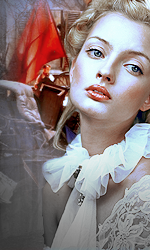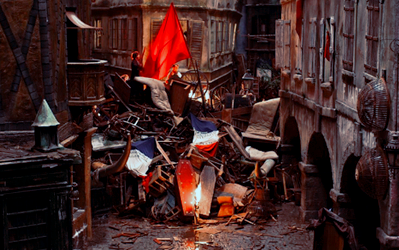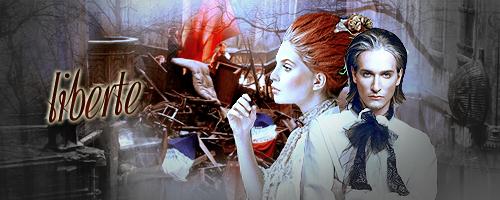Post by enjolras on Jan 17, 2013 14:40:19 GMT -5
| [atrb=cellSpacing,0,true][atrb=border,0,true][atrb=style, width: 460px; background-image: url(http://i44.tinypic.com/34fb0ns.jpg);-moz-border-radius: 0px 0px 0px 0px; -webkit-border-radius: 0px 0px 0px 0px; border: 4px ridge #7a9aa9, bTable][tr][cs=2] Reynard Enjolras. Twenty-two. Les Amis de l'ABC. Aaron Tveit. | |
| [rs=2] | 15 Février 1828 Place du Châtelet (ou à peu près) My fingertips have begun to tremble. I can barely write, I can scarcely scrawl. I am overcome by a pale unhallowed gluttony that, almost joyfully, deprives me of sight; it has claimed my awareness, my gallantry, my ignored pseudo-seemliness. The heat in my fingertips has gradually enhanced, causing them to faintly, momentarily, darken from this cold carrion-grey to a near human-hue of dusky apricot. How can I transcribe it? I am merely two and twenty and yet I have seen the world has shifted. My mind has been ignited; it seems lambent and polychromatic, vivified from a dark and woeful burgundy. Oh, why can I only explain in colours? Are there no words for such emotions? My script is unreadable, my smile is eternal. I shall resume when I am calm. 16 Février 1828 Place du Châtelet My name is Reynard Enjolras (I record this for sheer formality) and I am, quite simply, aching. I am ardent and aflame. I am intrepid and audacious. I am proud, remarkably so, an attribute acquired from Évrard, my high-handed father, and one that seems to be the sole influence behind this notion. I have suddenly changed. I was once immature, and beguiling, and a terribly shameful flirt, offering occasional flashes of civilised exchange but only if one was able to maintain my airy attention – but now! – with such a strong conviction for justice and virtue, I have been overcome with a love of liberation. I am secretive and cautious; predisposed to divulge exceedingly detailed and fabricated histories, distributing very little of my true self save for my name and (approximate) age. You are intolerably stubborn, (a profession of Combeferre’s – paraphrased) socially ignoble and exceptionally reckless and, of course, you are gloriously distinctive. You have never fallen in love nor have you ever felt the need to seek it. And yet, despite such ignorant and libertine attitudes, bestowed upon me by unlit adolescence, I have grown curiously considerate, plagued by thoughts of others’ suffering and the possibility of deviating from preordained destiny. Men are their own salvation. Humanity its own redemption. I had chanced upon a General Lamarque, to whom I owe this cognitive shift, he lives for the unheard and breathes for the unheeded. He spoke of liberty; he told of discrimination, he circulated petitions. I have emerged a dutiful crusader. 28 Février 1828 Rue des Bons-Vivants My father is infuriated. He countered me at a demonstration; he heard the passion in my voice, the sincerity of my declaration, he demanded that such nonsense be halted, that I end this bout of scorching exhibitionism. Oh, père, comment pourrais-je? You are as debted as a drifter: your wealth that once lavished your thoughts has dwindled and fell and soon you shall be as wretched as the poor you so proclaim to despise. Do you so care for the middle son, born in Bonne-Nouvelle, while you were at sea, who so craved wisdom but not by the restrictive means of your tutors? Did you despite me then, in my earliest memories, when I neglected your coos and cahs as though you were but a stranger? Or was it when you learned of my disinterest in modern tutelage, my distain for art and linguistics? I grew in that stern shadow of yours, a world apart, absconding to the purlieus of Paris. At fourteen I had seen the reality of humanity, la souffrance de la France, but as had been instilled in me by your ‘omniscient’ nature simply assumed it was not my business – oh, I should burn this entry to cinders. It repulses me to think that this is how I thought – this haze I dwelled in all my life, unwittingly, foolishly, until my venture with Monsieur Lamarque. I am indebited to you sir. I cannot think for joy. How did I transfer, in such short a time, from that plain and unkempt youth, who devoted his time to sharing his heartache with grainy poets and worn recollections to a man of purpose and decency? I left that house at eighteen but only did I cut my dependence upon them within the last hour. Oh, it does not matter. Loneliness appears to be absent. More are heeding, amalgamating, longing, more are seeing through the haze of the bourgeois. They see the worth in their fellow men. They see the worth in themselves. They can see the government is unstable; their legislation makes me nauseous. We are plotting and calculating, arranging a multitude of strategies for varying circumstances, deftly omitting with diminutive defects, each destined for triumph. Young Enjolras, at twenty-two and half, is bold and blazing. I yearn for the solace I had abandoned as a child and the freedom I visualised as a wistful adolescent. I ache. I ache for my family, for the nation of France, for the segregation of diverse races, for the irksome repetitiveness of life and for the shortness of it. I have grown impatient; our time has finally come. The page is torn and tarnished. It is impossible to read. Herein lies a portrait, found in this now discarded journal, sketched by a former admirer when I was but nineteen. What was her name? I had taken no notice. Let us call her Liberté. I was never fond of the likeness anyway. I seem terribly pale, with no colour upon my cheeks or lips, with deathly-grey eyes, sooty-lashed, almost black in contrast to the ‘alluring gloom’ of my demeanour (L’s phrasing not mine), with a broad Aurelian nose and desirably sarcastic mouth, plump-lipped and scornful, illuminated by straight, albeit yellowed, teeth. I am portrayed with soft thick hair, not oily as it so often sits, tinted an obnoxious Slavic gold, not quite to my shoulders, but marvellously curled. My build is relatively standard, save for the fact that I am slightly taller than most. Portrayed with reasonably large hands, both white and feminine, with long Bohemian fingers, I appear smooth-skinned, exaggerated highly by Liberté, more so than my father, but with slightly more body hair; mostly upon the exposed part of my chest and torso. My style of dress is not particularly exceptional either: I am wearing a faded tsigane shirt, gathered at the wrist and loose at the collar (in the manner of les classe défavorisée, no less!), with dark buckskin breeches, again faded – as though that would exemplify a sense of credibility – and worn leather boots, poorly-laced and noticeably grazed. I am seen donning a shabby frock-coat, again of buckskin, this time viridian, abraded at the cuffs, missing perhaps two or three buttons. Written on the reverse are dictations and a small fragment of an incomplete novel, scrawled illegibly in abbreviated dialect, from a time several years ago when I hoped to be an author. It was just as well I never or I may have been detained for sacrilege. It reads thus: He could isolate, consciously, very little. Everything seemed blurred, yellow-clouded, yielding nothing tangible. The inept acrostics, maudlin evasions, theopathies – every recollection formed ripples of mysterious meaning. Everything seemed yellowly blurred, illusive, lost. The veil of casualty, the stonewashed scent, the inebriating murkiness of sinister demise, weighed hauntingly upon his mind, obscuring all manner of sentience, all sense of sensibility. He entered through the window, a shroud of vapour, which could have easily been interpreted as a faint fog, or haze of condensation (or divine breath), adding an uncomfortable weight to the air, aimed predominately at the child’s chest, intended to labour his inhalation, as though the creature were sitting upon the child’s dappled lungs, already crippled and worn. He filled the room, slowly, to the point of intoxication, escalating to near-translucence. He paused. He waited, one moment, two. The being then exhaled, retreating back to the foot of the bed, softly, transposing the air until it slowly, bitterly, gathered form. Initially it seemed like dust, lingering, apparently airborne, before surfacing the shape and sight of a mortal man, partially transparent as though made of stained-glass. He was exceptionally pale, marmoreal pale, with vibrant azure eyes and sepia brown hair. He stood soundlessly, at the foot of the bed, before leisurely looming towards the boy. He was aware of his inability to observe and hear but remained silent nevertheless; so much so that even a person of exemplary perception would not have noticed his bearing. He then outstretched his hand, which was repulsively pale, with elongated French fingers, before gently resting them upon the quivering boy’s forehead. His mouth coiled to that of a smirk, as he revered in the child’s reaction. The creature, dark-eyed and sable-souled, admired the panicked boy with a dreamy, greatly malicious, veneration. His name was Vendelín, at one time or another (while mortal he had been a pitied Slovak). He revelled, in a sort of black-blue daze, conflicting with the earlier golden expanse, heightened and heightened by that resplendent throaty panting. He inhaled. He could virtually taste faint essences, terror-rich whispers, which haphazardly fled the gasping child, filling the demon’s nasal cavities, consuming his heart and torturing his mind. Suddenly, during the summit of his elevation, the peak of near-perfect and glowing ecstasy, with his clammy hand still arrest upon the blond boy’s forehead, the child called out, feebly, inquiring as to the presence that stood infecting his thoughts. He stayed silent for a moment (perhaps to allow the stifling dread to escalate or to permit his climax a moment to recoil), simply, neutrally, observing the damaged youth. His smirk regained its composure. “I am your liberator,” his voice was deep and velveteen; tinged with amusement and speckled with arrogance. “Is that not what you have been praying for? A silk-winged seraph to take you into the very arms of rapture?” His hand moved from the child’s forehead and began to soothingly caress his saturated curls. “But none have remembered you, have they? They deemed you hopeless and vile; but not I. The suffering you feel is only a fraction, a soupçon, of that which I feel for leaving you so long. I shall help you; help you when no one else would.” His hand moved gently to cover the boy’s unseeing eyes. “Shall I mend that deplorable vision of yours? As a gesture of goodwill?” His fingertips heated, as though he had placed upon an open flame, absorbing with little effort the black, affected areas around his eyes, removing the mauve-heavy dapples of disease. As he waited for his vision to clear; Vendelín’s vindictive expression altered to one of pure sympathy. The pages are blank hereafter save for the phrase: Prolétaires de tous les pays, unissez-vous! |
Ada. Nineteen. RPG-D. |



